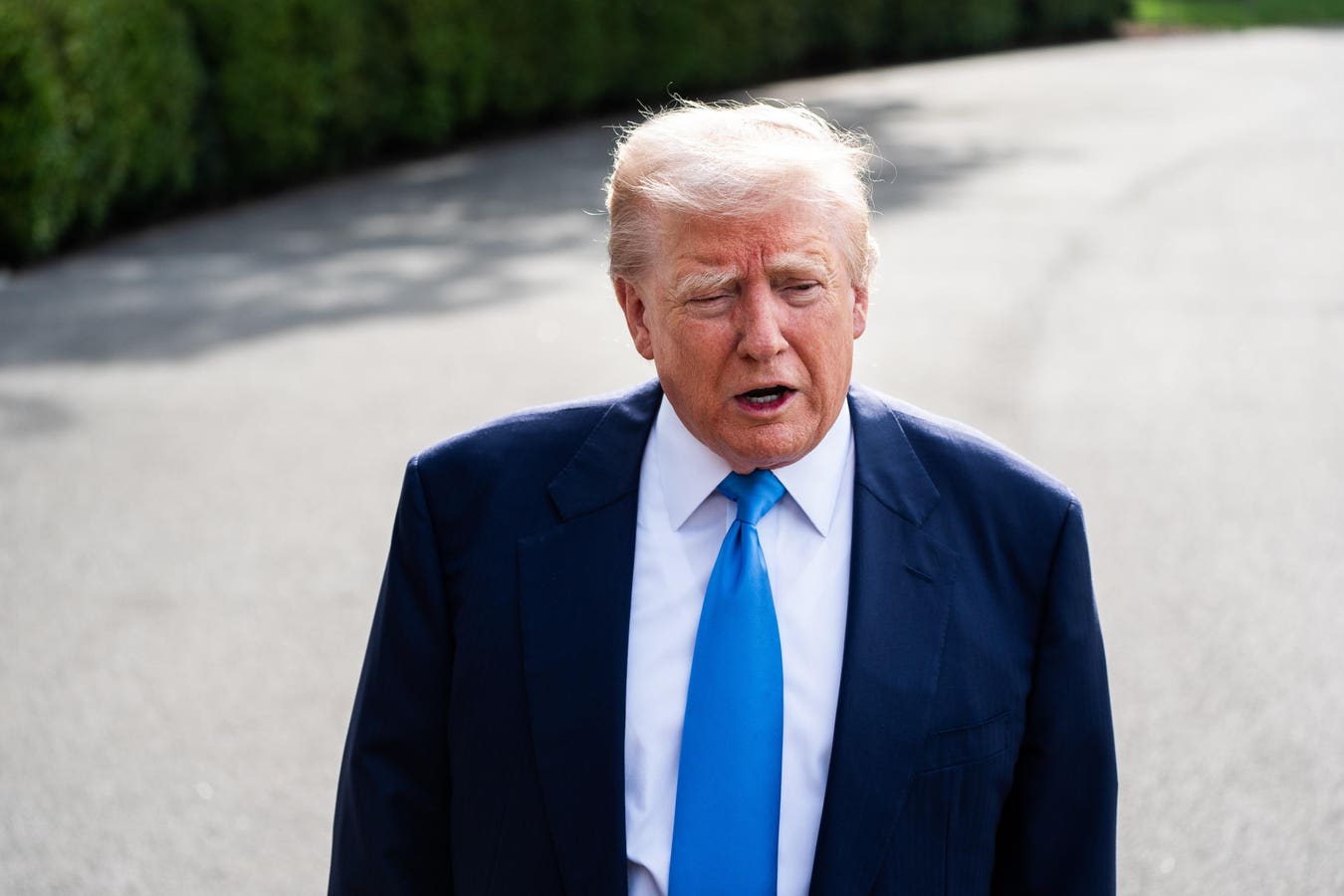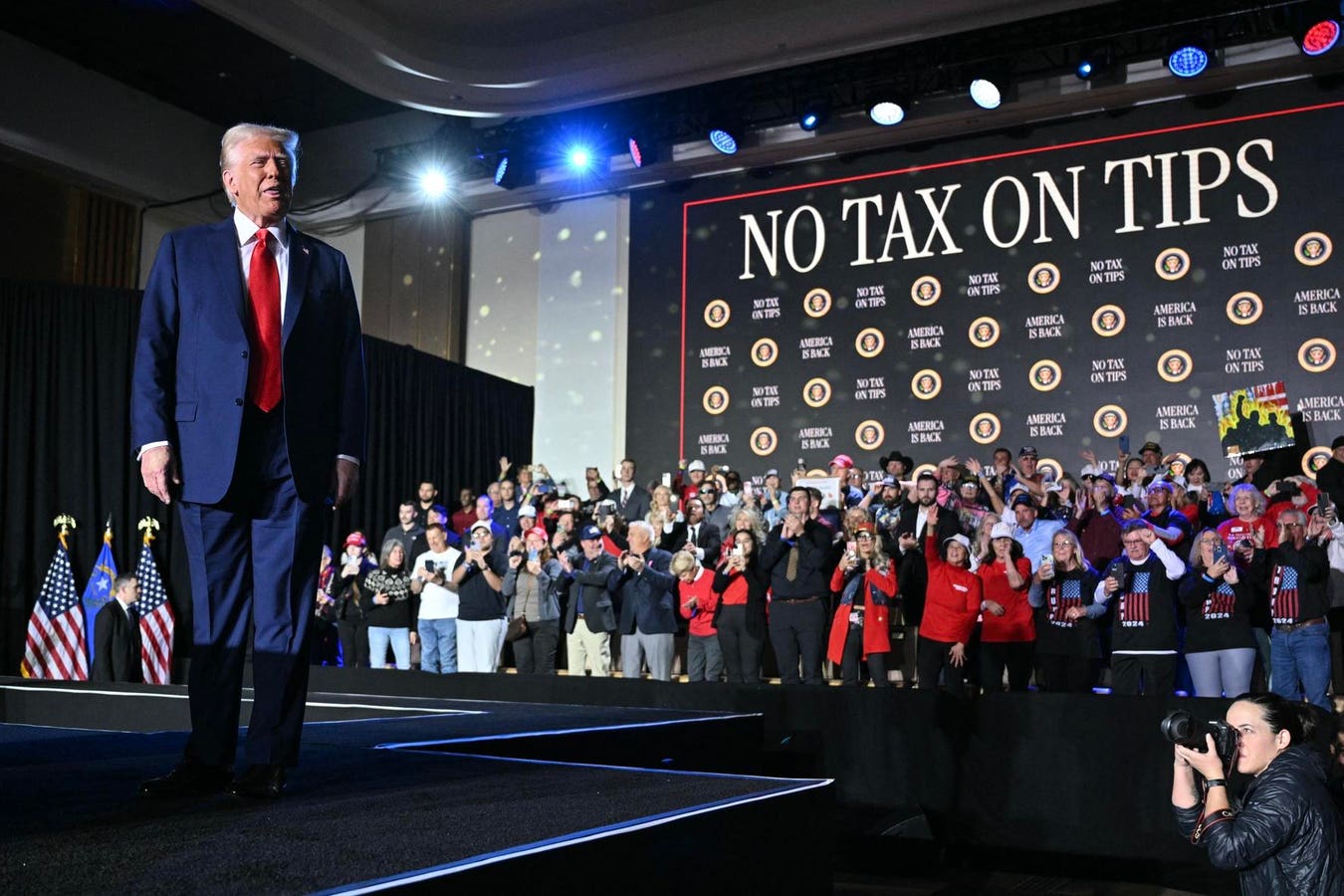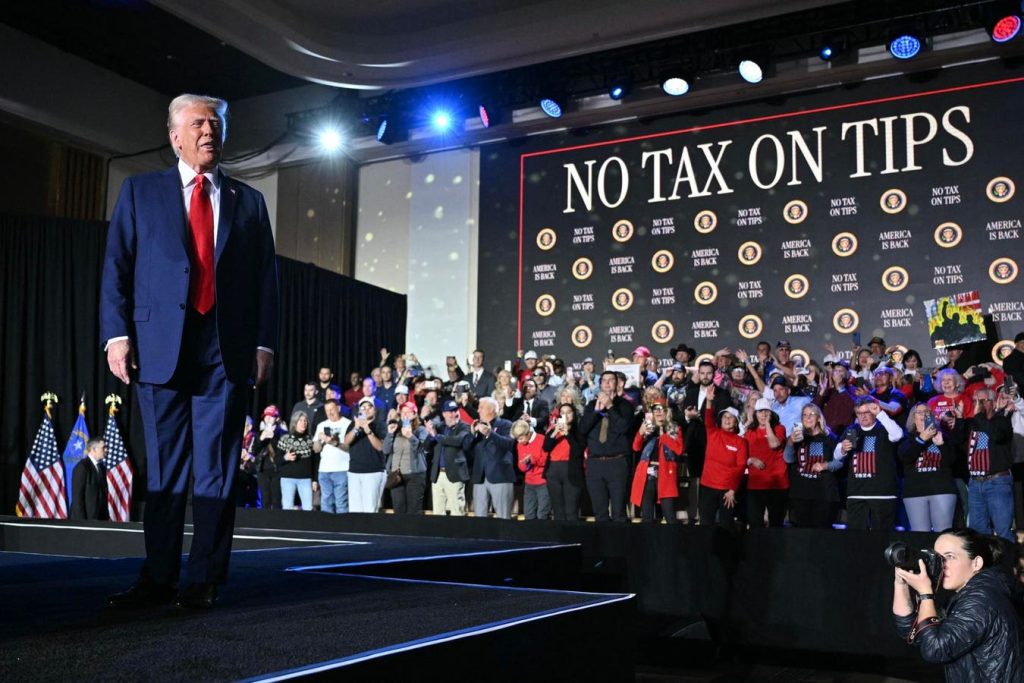May 19-2 net approval rating: Trump’s approval rating has improved two points, from 46% to 48%, and his disapproval rating has decreased two points, from 52% to 50%, in Morning Consult’s most recent poll, compared to its previous weekly survey (the most recent poll of 2,208 registered voters taken May 16-19 has a 2-point margin of error).
May 19-1: Trump’s approval rating stands at 47% and his disapproval rating at 48% in a new Harvard CAPS/Harris poll that also found widespread approval of his trip to the Middle East last week, with 59% of voters supporting his efforts to have strong relations with Saudi Arabia and 59% approving of his removal of sanctions against the Syrian government (the May 14-15 survey of 1,903 registered voters has a 2.2-point margin of error).
The poll was somewhat of an outlier in showing a three-point decrease in Trump’s net approval rating compared to the groups’ April poll, as most other surveys in recent weeks show his approval rating is on the rise.
May 13-9: Trump’s disapproval rating remained steady at 52%, while his approval rating ticked up one point, to 43%, in the Economist/YouGov’s weekly survey of 1,786 adult citizens taken May 9-12 (margin of error 3), compared to their poll last week.
May 12-6: Trump’s standing with voters in Morning Consult’s weekly poll was unchanged from last week, with 46% approving and 52% disapproving in the May 9-11 survey of 2,221 registered voters (margin of error 2).
May 9-16: Trump’s approval rating ticked up two points, to 41%, while his disapproval rating decreased by two points, to 57%, in an Associated Press/NORC survey of 1,175 adults taken May 1-5 compared to the groups’ previous survey last month that found Trump with a net -20 disapproval rating (the latest poll has a margin of error of 4).
May 6-6: Slightly more than half, 52%, disapprove of Trump, a rating unchanged from last week’s Morning Consult poll, while 46% approve, a one-point increase, according to the survey of 2,263 registered voters conducted May 2-4 (margin of error 2), as voters’ sentiment about his handling of the economy improved from a net -6 to net -2.
May 6-10: An Economist/YouGov survey taken May 2-5 among 1,850 U.S. adults also found Trump has a 52% disapproval rating, and a 42% approval rating, marking the second week in a row Trump’s approval rating did not fall after several weeks of decline (the poll has a margin of error of 3.5).
April 29-11: A PBS/NPR/Marist survey of 1,439 U.S. adults, taken April 21-23 found 53% disapprove of Trump’s job performance and 42% approve, compared to a 49%/45% split in the groups’ March survey (the latest poll has a margin of error of 3.3).
The survey found 61% believe Trump is rushing changes without considering the impact of his actions, though 39% believe he’s taking the appropriate actions to get the country back on track.
April 28-10: The majority, 55%, of the 2,356 U.S. adults who responded to an April 23-25 CBS/YouGov poll disapprove of Trump’s job performance, while 45% said they approve.
The majority, 69%, also said Trump is not putting enough emphasis on lowering prices, and 62% said he’s putting too much emphasis on imposing new tariffs.
April 27-18: Trump’s 59% disapproval/41% approval rating is the lowest for any newly elected president at this point in their term, dating back to Dwight Eisenhower in the 1950s, according to a CNN/SSRS poll of 1,678 U.S. adults conducted April 17-24 (margin of error 2.9).
April 27-10: A poll from NBC News, which surveyed 19,682 adults from April 11-20, found 55% of Americans disapproved of Trump’s handling of his job, while 45% approved (margin of error of 2.2 points).
Furthermore, 60% of respondents said America is on the wrong track, and more respondents disapproved than approved of Trump’s handling of immigration and border security (51% disapproved), his handling of inflation and the cost of living (60% disapproved) and his handling of tariffs and trade (61% disapproved).
April 25-16: Trump’s net approval rating declined from -8 in February in the most recent survey of 2,464 U.S. adults conducted April 18-22 by Ipsos for The Washington Post and ABC News (margin of error 2).
April 25-12: Trump had a 42% approval rating and 54% disapproval rating in a New York Times/Siena poll that also found the majority of voters reject his handling of immigration, management of the federal government, the economy, trade, foreign conflicts, the Russia-Ukraine war and the deportation of Kilmar Abrego Garcia (the poll of 913 voters conducted April 21-24 has a 3.8-point margin of error).
More than half also said the words “scary” and “chaotic” describe the Trump presidency well, including significant shares of Republicans: 47% for chaotic and 36% for scary, though 82% of Republicans also said the word “exciting” describes Trump’s tenure well.
April 23-19: Pew found 59% of 3,589 respondents to an April 7-13 survey (margin of error 1.8) disapprove of Trump’s job performance, compared to 40% who approve, a seven-point decline in his approval rating since February.
The majority of respondents said they aren’t confident in Trump to handle each of the 10 issues Pew asked about, while the 45% who said they’re confident in Trump to handle the economy represent his worst marks since 2019.
April 23-11: A majority, 53%, of respondents to a Reuters/Ipsos poll taken April 16-21 disapprove of Trump’s job performance, while 42% approve, a steep decline from his +6 net approval rating in the groups’ poll taken during the first week of his second term, but largely unchanged from the groups’ previous survey taken March 31-April 2 (the latest poll of 4,306 U.S. adults has a margin of error of 2).
Trump’s handling of the economy received a net -14 approval rating (37% to 51%), better than Biden’s 34% economic approval rating in December, but below Trump’s worst economic approval rating (44%) during his first term, Retuers/Ipsos found.
April 23-30: A Harvard Kennedy School survey of young adults found 61% disapprove of Trump and 31% approve, while 42% think Trump will hurt their personal finances and 20% believe he’ll help, 9% said he’ll have no impact and 26% said they don’t know (the poll of 2,096 18- to 29-year-olds taken March 14-25 has a margin of error of 3.2).
Younger voters typically lean toward Democratic presidential candidates, though Vice President Kamala Harris’ numbers with the demographic were below the 60% average support for Democratic presidential candidates since 2008, according to a NPR analysis.
While more young men voted for Trump in 2024—56% compared to 41% in 2020, according to an analysis of Associated Press exit polls by the Center for Information & Research on Civic Learning and Engagement at Tufts University—the Harvard poll found 34% of young men approve of Trump’s job performance and 59% disapprove.
April 23-13: An Economist/YouGov poll of 1,625 U.S. adults taken April 19-22 (margin of error 3) found 54% disapprove of the way Trump is doing his job, compared to 41% who approve, representing a two-point decline in Trump’s approval rating since the groups’ previous poll released April 16.
April 21-6: Trump’s approval rating improved (from 45% to 46%) for the first time since February in Morning Consult’s latest weekly poll, while 52% disapprove of his job performance, though his handling of the economy received its worst marks—49% disapproval compared to 44% approval—since the start of his trade war in April (the latest poll of 2,207 registered voters conducted April 18-20 has a margin of error of 2).
April 17-9: More than half, 53%, of respondents disapprove of Trump’s job performance in Gallup’s April 1-14 survey of 1,006 adults (margin of error 4), while 44% approve.
Federal Reserve Chair Jerome Powell, who Trump recently said he’s considering firing, has a 37% approval rating, beneath the lowest approval ratings for the previous three federal reserve chairs, but above his 36% average approval rating in 2023, Gallup found.
April 16-10: An Economist/YouGov poll of 1,512 U.S. adults found 52% disapprove of Trump’s job performance, compared to 42% who approve (margin of error 3.4).
April 14-7: Trump’s approval rating dropped to a new low for his second term in Morning Consult’s weekly poll, with 45% approving of his job performance and 52% disapproving (the poll of 2,203 registered voters was taken April 11-13 and has a 2-point margin of error).
On trade, Trump has a net -5 approval rating, and 24% of respondents said it’s a top priority for Trump, though only 48% think it should be.
April 14+2: Representing an outlier in polls taken since Trump’s April 2 tariff announcement, Harvard CAPS/Harris found 48% approve of Trump’s job performance and 46% disapprove, a seven-point decline in his net approval rating compared to the groups’ February poll and a two-point decline since March (the latest survey was taken April 9-10 among 2,286 registered voters and has a 1.9-point margin of error).
Voters’ perceptions of the economy as a whole are largely unchanged since January, even though a greater share, 45%, say their financial situation is getting worse, compared to 41% in the groups’ previous survey in March—while Trump’s handling of inflation, and tariffs and trade policy, had the worst approval ratings, both at 41%, of eight issues the poll asked about.
April 14-7: A University of Massachusetts poll of 1,000 U.S. adults conducted April 4-9 by YouGov found 51% disapprove of Trump’s job performance, while 44% approve (the poll has a 3.7-point margin of error).
Trump received his worst approval rating of six issues the poll asked about on inflation (33%), followed by trade (36%), civil rights (36%), jobs (38%), foreign affairs (39%) and immigration (50%).
April 13-6: More than half, 53%, of the 2,410 U.S. adults who responded to an April 8-11 CBS/YouGov poll said they disapprove of Trump’s job performance, compared to 47% who approve (margin of error 2.4 points), a dip in Trump’s rating since the groups’ March survey that found equal shares of Americans approve and disapprove.
The poll also found 58% oppose and 42% favor Trump’s new tariffs on imported goods, but 51% like his goals for the tariffs—to return manufacturing jobs to the U.S. and decrease the import/export margins between the U.S. and its trading partners, he has said—though 63% dislike his approach for achieving those goals.
More Americans, 59%, believe Trump is using the new tariffs to negotiate with other countries and will remove them later, compared to 41% who think he’ll keep them permanently.
April 9-12: Trump’s disapproval rating stayed stagnant, at 53%, in the latest Quinnipiac University poll taken April 3-7 among 1,407 self-identified registered voters, though his approval rating decreased one point, to 41%, compared to the group’s previous survey taken in March (the shift is within the poll’s 2.6-point margin of error).
The poll found the majority of voters (72%) think Trump’s tariffs on all U.S. trading partners would hurt the economy in the short-term, while 53% said they believe the policy would hurt the economy in the long-term.
April 9-8: A new Economist/YouGov survey taken April 5-8, after Trump’s sweeping tariff announcement on April 2, found 51% disapprove of his job performance, compared to 43% who approve, a five-point swing since the groups’ previous survey taken March 30-April 1 (the latest survey of 1,741 U.S. adults has a margin of error of 3.1 points).
April 7-6: Representing the lowest rating of his second term in Morning Consult’s weekly poll, 46% of registered voters surveyed said they approve of Trump’s job performance, compared to 52% who said they disapprove (the survey of 2,207 registered U.S. voters was conducted April 4-6 and has a margin of error of 2 points).
Trump’s net approval rating on trade also declined to -3, down from +13 just after taking office in January.
April 2-8: A Marquette Law school poll found Trump has a 46% approval rating and a 54% disapproval rating (the survey of 1,021 U.S. adults was taken March 17-27 and has a margin of error of 3.5 points).
The majority, 58%, of respondents said they think tariffs hurt the economy, while 28% said they help and 14% said they don’t make much difference—as Trump has imposed new tariffs on Canada, Mexico and China, steel aluminum and auto imports, and is expected to announce a new round of reciprocal tariffs against U.S. trading partners Wednesday, which the White House is referring to as “Liberation Day.”
The share of registered voters who say they identify with Trump’s Make America Great Again movement has increased sharply during Trump’s second term, according to NBC polling. A total of 36% of 1,000 registered voters polled March 7-11 said they consider themselves part of the MAGA coalition, compared to a 23% average in NBC’s March polling and 27% in the network’s 2024 polls (the most recent poll has a 3.1-point margin of error).
44%. That’s Trump’s average approval rating so far during his second term, higher than his 41% average approval rating throughout the duration of his first term, according to Gallup, but lower than every other post-World War II president.
Trump announced on May 12 he’d slash the 145% tariffs on China down to 30%, for at least 90 days, marking his latest reverse-course from the steep “Liberation Day” tariffs he announced on April 2 against nearly all U.S. trading partners. The move sent stock markets in the U.S. and abroad into a tailspin, fueled recession fears and prompted some of Trump’s allies in the business community to speak out against the policy. A 10% baseline tariff on all countries took effect April 5, and steeper rates for countries the U.S. runs a trade deficit with were imposed for less than a day in mid-April, until Trump announced a 90-day pause for all countries except China. Other big moments in Trump’s presidency include the leak of U.S. military attack plans to Atlantic editor-in-chief Jeffrey Goldberg, what was widely considered to be the first major blunder of his second term. Trump’s tariff war with U.S. trading partners, and his efforts to slash the federal workforce with the help of the Elon Musk-led Department of Government Efficiency, have largely consumed his first few months in office. He’s hosted several world leaders for Oval Office sit downs, including most recently Canadian Prime Minister Mark Carney, who was elected, in part, for his tough talk against Trump’s suggestions that Canada should become the 51st state. In an explosive Oval Office meeting with Ukrainian President Volodymyr Zelenskyy in February, he and Vice President JD Vance berated the Ukrainian president in front of the media. Trump’s use of the Alien Enemies Act of 1798 to deport migrants has also led to allegations he’s flouted due process and defied court orders, sparking a broader debate about the judiciary’s authority over the executive branch.












